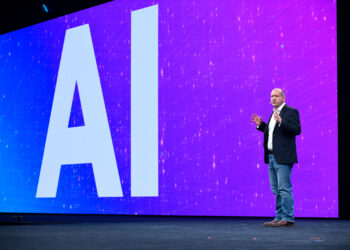A mere six months have passed since I last wrote about AI and, my word, things have picked up pace since then…
– Midjourney are now on version 5.2 (producing genuinely incredible images). Similar image generation tech is available elsewhere, but I just love the quality here – it’s possible to create amazing photos and art. More simplistically, it took me approximately 30 seconds to use the free Stable Diffusion offering this morning to create the image for this blog – with the prompt “artificial intelligence hype”….
– Video creation of real quality is starting to look achievable within the near(ish) term
– Google have announced a big batch of AI features in the cloud space (Duet assistance, new LLMs [large language modules], enhancements to VertexAI, etc)
– The investment markets have gone bonkers. Databricks bought a three-year old 60-ish person company (MosaicML, training LLMs) for circa $1.3bn this month. Elsewhere Mistral (https://mistral.ai/), raised what they’ve called a “Series-A”… of over $100m…. Pleasingly, Mistral is based in Europe, which is nice to see – even if I wouldn’t put my own money there right now. Did I mention Mistral don’t have a business yet, just an idea? (ok, and some very smart founders, and doubtless a plan to buy a load of tricky to acquire hardware with the money). Still…bonkers.
– Everywhere you could choose to look, the service is now “AI enabled”, and every business is now claiming an “AI practice”. In reality, most people are still learning how to do this, beyond the headline claims and hype.
In practice?
As is often the case with newer technologies, I like to think the best ideas aren’t always visible yet – but there’s plenty to be going after right now. For example, in a business context we’re seeing:
– At the more accessible end, Duet coming very soon to GA for Google’s Workspace customers (similar goings on in the Microsoft world, but I spend my life in Google). This is going to accelerate the speed of content creation and collaboration in a way I don’t think we’ve seen since 2011 when Google turned on real “live” collaboration that worked instantly.
– The use of pre-built components to streamline or augment existing processes, e.g. for chat bots that really feel ‘human’ to solve problems for customers, or for the use of voice technology to complete user workflows like a hotel booking, or image recognition to assess an insurance claim.
These things aren’t completely “red hot and new” – people have been building them for a few years now. But what’s interesting is the quality of the solution is now way stronger than it used to be versus the time taken to build it decreasing – and proof of concepts are very much in reach quickly.
– Development of industry-specific learning models. For instance, Google have released recently around both healthcare and insurance, and I’m sure that list will continue to expand.
Per some of the M&A activity mentioned earlier, and VertexAI’s development, creation of a company’s specific models is now within reach of “normal” organisations, with the democratisation (great word) via cloud making it easier to achieve than ever. Demand forecasting, fraud detection, medical image detection, customer service agents, etc, all now possible to build pretty quickly and very effectively.
– An acceleration in developer productivity with the Duet/CoPilot functionality becoming available in platforms, accelerating what used to be a manual hunt on the web, or some trial and error.
Surely some risks?
If we ignore the “AI is taking over the world and will steal your job/wife/husband” view, I’d classify the main risks as:
– First up: businesses not understanding what’s private and what isn’t. For example, Bard is turned off by default within Workspace accounts – as it’s more of a consumer offering, and it’s not private (same with default ChatGPT), and will train/learn from your data inputted – and could regurgitate that back at other users in some cases. Understanding the security model of any environment you use is paramount.
– Model quality, in terms of bias. Your model is only as good as the data you train it on – and if we’ve seen one thing in recent years, it’s been a risk of outcomes that are bias towards the beliefs, views and backgrounds of people that create it. That could be politics, gender, race, or pretty much anything else that’s easy to miss without a diverse team – but has a serious impact when rolled out to the world. I’ve seen arguments that if governments focus on legislation on AI, this is the primary area to focus on, and I don’t disagree
– This one might seem a bit odd, but arguably the developer acceleration piece is less good in some circumstances. The democratisation (there it is again!) of the ability to create code is definitely a good thing, but equally for students learning now, there’s a school of thought that people aren’t always learning *how* to solve problems in some instances, as code is being generated for them which they don’t really understand in enough detail. That’s arguably not wildly different from days of yore when I used to copy code from SourceForge, other than it’s a lot easier to access and you may not get quite what you’re expecting
– It would also be remiss of me to not encourage people to think about their own business model, and how it might evolve over time. e.g. do you run a T&M consulting based organisation where a customer problem can now be solved in 2 days instead of 10? How are you going to adapt to that? It needs thought, lest it catch you out.
– And finally….gold old fashioned snake oil. Everything is being rebranded as AI. Make sure you know what you’re buying, and how it really works.
So, have we reached peak AI hype?
No chance, this has got a while to run yet! The key now is getting involved in some experiments to see what’s possible, and get your organisation educated and excited. Building capability and competence early, as with any “new” technology is generally my advice. You can take that at whatever pace you like of course, but definitely get started.
Not sure if I’ll leave it another 6 months to scribble some thoughts next time, I suspect things are moving too fast.
Chris Bunch
Chris Bunch is formerly managing director of Google consultancyCloud Technology Solutions
















